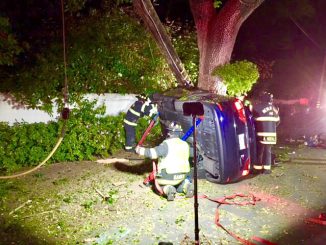
BY EMILY MIBACH
Daily Post Staff Writer
For the past nine years, state Sen. Jerry Hill, D-San Mateo, has been one of the most visible critics of PG&E, which suffered stinging criticism last week over its decision to preemptively cut off power to hundreds of thousands of customers to prevent wildfires.
The Post asked Hill if he thinks he has accomplished anything regarding PG&E over that time.
“I’d like to think I’ve helped raise awareness about PG&E,” Hill responded in an email to the Post.
Hill has been the lead elected official to examine PG&E and attempt to hold the utility accountable for mismanagement. Hill’s been focused on PG&E since the San Bruno pipeline explosion in 2010 that leveled 38 homes and killed eight people.
After that tragedy, PG&E was fined $1.6 billion by the state’s regulatory agency, the Public Utilities Commission, and a federal jury convicted the company of violating pipeline safety regulations and one charge of obstructing National Transportation Safety Board investigators.
Protecting consumers
Hill was also the first to call foul over bills in the state legislature proposed last year that would have forced PG&E customers to pay for settlements from the fires in the North Bay and Paradise.
Hill spoke out against Assembly bills 33 and 1088, calling them bail outs for the utility.
Assembly Bill 33, authored by Assemblyman Bill Quirk, D-Hayward, would have allowed for PG&E to sell state-backed “recovery bonds” to pay the settlements and require all ratepayers to pay off the bonds as a “non-by passable charge” on their bill.
SB1088, would have required utilities to submit disaster plans every two years. But critics said SB1088 could potentially limit the utilities’ liability in a catastrophe and lead to higher rates.
Neither bill made it to the governor’s desk.
Hill was one of four “no” votes against Senate Bill 901, which gave the state the ability to spend $1 billion over the next five years to clear brush and give PG&E a way to saddle customers with paying for wildfire expenses.
PG&E bailout
Hill voted against the bill, which was ultimately signed by then-Gov. Jerry Brown. Hill called it a bailout and said the spending of nearly $1 billion rewarded PG&E rather than penalized the utility.
“Ultimately, we must hold PG&E accountable to make its electric power system safer, just like other utilities have done after fires — as SDG&E did after the 2007 wildfires in San Diego County,” Hill said in an email to the Post at the time.
Hill has also introduced his own set of bills in attempts to reform PG&E, but most have died in committee.
This means Hill has been largely stuck to writing letters expressing his displeasure with the utility, showcased last week when he wrote a letter decrying PG&E’s decision to turn off the power to some 800,000 customers.
“I strongly disagree with the binary position currently offered by PG&E — they can turn the power off and shut down the economy and livelihoods of millions in California, an action which may protect us from a wildfire; or they can roll the dice and continue with the lights on, and risk an enormous fire starting from their power lines. This situation is not acceptable nor sustainable,” Hill wrote in his letter criticizing PG&E’s lack of finesse in executing the power outages.




You’d think that, given his position and authority, he could have done more to prevent PGE from collapsing into the state that it is today.